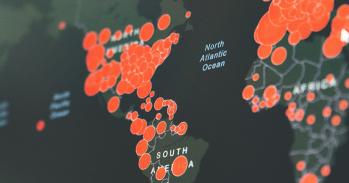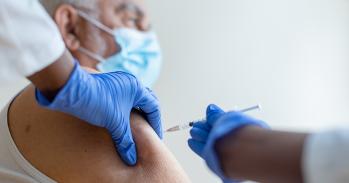
“The psychology of pandemics was not on my research agenda, but I can tell you one thing: it is now,” says Dr Sander van der Linden. As an expert in psychological and behavioural science, his research has - until recently - been focused on societal risks like climate change and misinformation. Suddenly he has a lot to contribute to the pandemic response.
“The psychology of pandemics was not on my research agenda, but I can tell you one thing: it is now,” says Dr Sander van der Linden. As an expert in psychological and behavioural science, his research has - until recently - been focused on societal risks like climate change and misinformation. Suddenly he has a lot to contribute to the pandemic response.
This article is part of a series in which we speak to some of the many Cambridge researchers tackling COVID-19. For other articles about our latest COVID-19-related research, click here.
I normally work in the Old Cavendish Laboratory, where I run the Cambridge Social Decision-Making lab. It’s a historic landmark where Watson and Crick discovered the structure of DNA. I never thought I’d say this, but I miss the tour groups pausing below my window every morning. I work from my home in Cambridge now, around the corner from Midsummer Common. The cows are out this time of year, so we often exchange theories about the pandemic when I go for a walk. They seem mostly skeptical, uninterested, and refuse to wear masks, but we get along well otherwise.
In my view, the pandemic is as much a behavioural as a biological problem. We need a vaccine, but we also need people around the world to coordinate their behaviours to help slow the spread of the virus. The required behavioural changes range from the relatively mundane, such as frequent hand washing, to making costly personal sacrifices by self-isolating at home. This necessitates knowledge about human cooperation as well as economic and social inequalities. Models that attempt to forecast the benefits of widespread social distancing and self-isolation also depend on accurate estimates of human behaviour under various conditions.
Behavioural science is also relevant in terms of how to communicate the science to the wider public, how to communicate uncertainty and risk, and how to protect people from the onslaught of fake news and misinformation about COVID-19. I am honoured to have been part of an effort to synthesize what behavioural science has to contribute to the pandemic, as part of a team of 40 international experts around the world. I hope that the article Using social and behavioural science to support COVID-19 pandemic response, published in the journal Nature Human Behaviour, will be useful to policy-makers.
My research looks at how humans make judgments and decisions. This could be about information, risk, societal issues, or other people. In collaboration with our partners we developed Bad News, an award-winning interactive online game. It helps inoculate players against fake news and misinformation, including fake news about COVID-19. We rely on the biomedical analogy: just as administering a weakened dose of a virus triggers the production of antibodies to confer immunity against future infection, the same can be achieved with information. By actively exposing people to severely weakened doses of the tactics used to produce fake news, people gain psychological immunity (or mental ‘antibodies’) against misinformation.
We use a large variety of methods to study human decision-making. We frequently test our interventions ‘in the wild’, for example, our study on the BBC news site tested how people react to uncertainty about scientific facts, and when ‘reality’ is not an option, we use virtual reality! So in a sense, our ability to do research has not been massively affected by the pandemic. A large chunk of it happens online using experimental and computational methods, online surveys, and ‘big data’.
Human behaviour is notoriously variable, and difficult to change and predict. I think it’s one of the biggest challenges of this pandemic. If we don’t get it right, there’s a chance the spread of the virus will pick up again as restrictions are relaxed. The constant stream of misinformation is also a major challenge. For example, concerted disinformation campaigns have the potential to undermine public willingness to vaccinate if people do not believe the vaccine is safe. In addition, several leading nations in the world have not adopted evidence-based strategies, which is a major hurdle.
I’ve been really impressed by the way the research community has come together so quickly. I’m on the management board of the Winton Centre for Risk and Evidence Communication, which has been able to track public opinion on COVID-19 around the world almost immediately. The Centre has pivoted many of their resources to help provide empirical data on how to best communicate evidence during the pandemic. The Cambridge press office has also been fantastic in helping researchers communicate their findings and expertise.
My own research programme has taught me the power of a proactive approach. Prevention is better than cure. People forget that this applies to psychology and communication too. For example, inoculation is all about pre-emptively protecting people from future harm, both in a biological as well as in a psychological sense. The same goes for communication of risk. Much of the response to COVID-19 was reactive, too late, and not well-prepared. One of the wonders of the human brain is our ability to simulate the future. We can start now.
When the pandemic is over, I’m looking forward to a cold beer with friends who are less than six feet away. I can’t wait to sit outside in the sun with colleagues, family, and friends, and have a good laugh again. It’s the little things in life. In the words of Sir Arthur Conan Doyle, “It has long been an axiom of mine that the little things are infinitely the most important.”
Sander van der Linden is Director of the Cambridge Social Decision-Making Lab in the Department of Psychology and a Fellow of Churchill College. Listen to him discuss the psychological aspects of isolation, on Cambridge's Centre for Science and Policy podcast: Science, Policy & Pandemics Episode Five.
How you can support Cambridge’s COVID-19 research

The text in this work is licensed under a Creative Commons Attribution 4.0 International License. Images, including our videos, are Copyright ©University of Cambridge and licensors/contributors as identified. All rights reserved. We make our image and video content available in a number of ways – as here, on our main website under its Terms and conditions, and on a range of channels including social media that permit your use and sharing of our content under their respective Terms.




